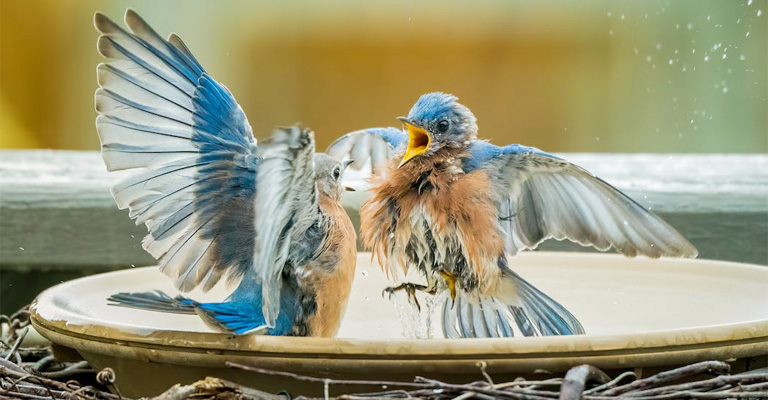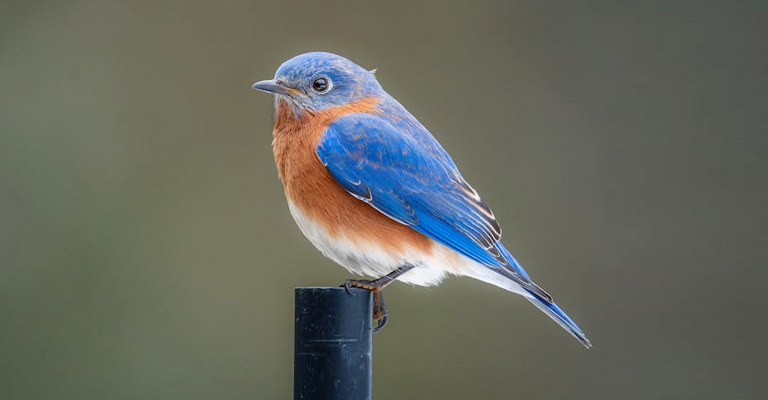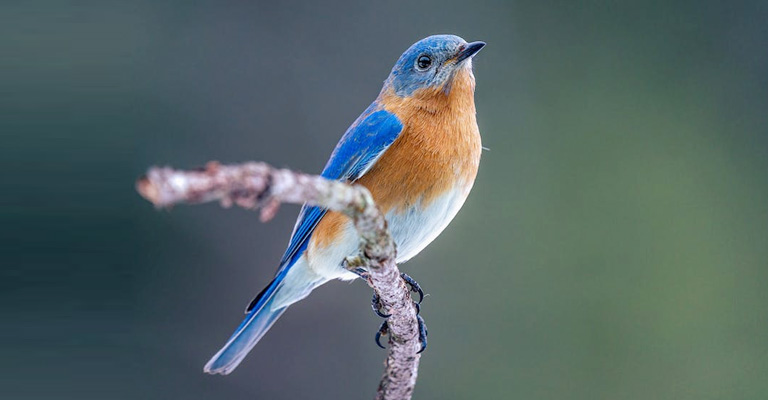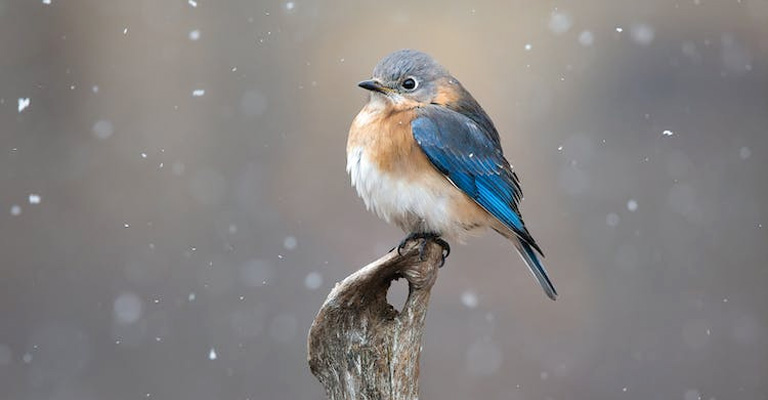Bluebirds are undoubtedly captivating with their vibrant plumage and melodious songs. Their presence can be enchanting, making it tempting to consider them as pets.
However, it’s essential to understand that bluebirds are not meant to be domestic companions. In this post, we delve into the topic ‘Do Bluebirds Make Great Pets?’, shedding light on the reasons why they are better appreciated in their natural habitat.
Bluebirds are wild creatures, and attempting to keep them as pets can have significant ethical, legal, and practical implications. We’ll explore the challenges of trying to tame these delicate songbirds, emphasizing the importance of responsible wildlife conservation efforts. Stay focused.

The Nature of Bluebirds with Human
Bluebirds, with their striking blue plumage, have long captivated human fascination. These small songbirds are a symbol of joy and hope. They often evoke feelings of serenity and connection with nature when encountered by humans.
Bluebirds are known for their melodious songs, which add a delightful soundtrack to gardens and open spaces. Human interaction with bluebirds often centers around providing them with nesting boxes and food.
Many people actively participate in bluebird conservation efforts, ensuring these birds have suitable habitats and protection from predators. Beyond their aesthetic appeal, bluebirds symbolize the fragile balance between humanity and the environment.
Their presence reminds us of our responsibility to preserve nature’s beauty and diversity. In the company of bluebirds, humans find a reminder of the enchanting harmony that can exist between the natural world and ourselves.
Do Bluebirds Make Great Pets?

Bluebirds do not make great pets. These beautiful birds are wild creatures and are best appreciated in their natural habitat. Attempting to keep them as pets is both impractical and unethical.
Bluebirds are migratory songbirds that require ample space to fly, forage, and thrive. In captivity, they may suffer from stress and loneliness, leading to health problems.
Additionally, bluebirds have specific dietary needs that are challenging to replicate in captivity. Feeding them appropriately can be difficult and may result in malnutrition.
Furthermore, keeping bluebirds as pets is generally illegal in many places due to wildlife protection laws. Capturing or confining them can have serious legal consequences.
To appreciate bluebirds, it’s best to provide them with suitable nesting boxes and create a welcoming environment in your yard or garden. This way, you can enjoy their beauty and song while respecting their role in the ecosystem.
The Pros of Keeping Bluebirds as Pets

While bluebirds are captivating and beautiful birds, it’s important to clarify that they are wild animals and not typically kept as pets. However, if you are considering the idea of keeping bluebirds, here are some potential pros:
Aesthetic Beauty
Bluebirds are known for their stunning plumage and can be a visually appealing addition to your surroundings.
Melodious Song
Bluebirds are excellent singers, and their songs can provide a pleasant and soothing background in your outdoor space.
Educational Value
Keeping bluebirds could offer an educational opportunity for learning about their behaviors, life cycles, and the importance of wildlife conservation.
Connection to Nature
Caring for bluebirds might deepen your connection to the natural world and foster an appreciation for wildlife.
However, it’s crucial to emphasize that keeping bluebirds as pets is generally discouraged and may be illegal in many places. Bluebirds are best enjoyed in their natural habitat, and efforts should focus on conserving and protecting these birds rather than attempting to domesticate them.
Providing suitable nesting boxes and creating a bird-friendly environment in your yard is a responsible way to appreciate these delightful creatures.
The Cons of Keeping Bluebirds as Pets

Keeping bluebirds as pets is generally not recommended for several reasons, including:
Legal Restrictions
In many places, it’s illegal to capture or keep native bluebirds as pets due to wildlife protection laws.
Stress and Health Issues
Bluebirds are wild animals and may suffer from stress and health problems when confined in captivity. They are naturally adapted to life in the wild and require ample space to fly, forage, and socialize.
Specific Dietary Needs
Bluebirds have specialized dietary requirements that can be challenging to meet in captivity. Providing them with the appropriate diet, including a variety of insects, can be difficult and may lead to nutritional deficiencies.
Loneliness
Bluebirds are social creatures that typically live in pairs or small family groups. Isolating them in captivity can lead to loneliness and behavioral issues.
Disruption to Ecosystem
Removing bluebirds from their natural habitat can disrupt local ecosystems and reduce their population in the wild.
Unpredictable Behavior
Bluebirds are not domesticated animals, and their behavior can be unpredictable. They may not adapt well to human interaction and can become stressed when handled.
While bluebirds are fascinating and beautiful birds, they are best enjoyed in their natural habitat or in bird-friendly environments in your yard or garden. Keeping them as pets is discouraged, often illegal, and can lead to negative consequences for both the birds and their ecosystems.
Alternatives to Pet Bluebirds
If you’re interested in bluebirds but don’t want to keep them as pets, there are several alternative ways to enjoy their presence and contribute to their conservation:
Nesting Boxes
Provide nesting boxes designed specifically for bluebirds in your yard or garden. This helps create a suitable habitat and encourages bluebirds to nest and raise their young in a natural setting.
Native Planting
Plant native trees, shrubs, and flowers that attract insects, which are a crucial part of the bluebird diet. Native plants also provide natural nesting sites and shelter.
Water Features
Install a bird bath or small pond in your yard to provide bluebirds and other birds with access to clean water for drinking and bathing.
Feeding Stations
Set up bird feeders with mealworms, berries, and other suitable foods for bluebirds. Ensure the feeders are designed to deter larger birds and squirrels.
Habitat Preservation
Support local efforts to conserve and protect natural habitats where bluebirds thrive. This can include participating in habitat restoration projects and supporting wildlife conservation organizations.
Education
Learn more about bluebirds and share your knowledge with others. Promote awareness of their habitat needs and conservation challenges.
Citizen Science
Get involved in citizen science projects that monitor bluebird populations and gather valuable data for research and conservation efforts.
Photography and Bird Watching
Enjoy the beauty of bluebirds through bird watching and photography, respecting their natural behaviors and habitat.
By taking these alternative approaches, you can appreciate bluebirds while also contributing to their well-being and conservation in a responsible and ethical manner.
Tips to Pet a Bluebird for The First Time
Petting a bluebird or any wild bird is not recommended and is generally not an appropriate or ethical practice. Bluebirds, like all wild animals, are best enjoyed from a distance and should not be handled or touched. Here’s why:
Stress and Injury
Handling a wild bird can cause extreme stress, which can lead to injury or even death. Birds are delicate creatures with hollow bones, and the stress of being handled can cause physical harm.
Disease Transmission
Wild birds may carry diseases that can be transmitted to humans through contact. Handling a bird can put both you and the bird at risk of disease transmission.
Legal Issues
In many places, it is illegal to handle or capture wild birds without proper permits. Laws protect wild birds and their habitats, and attempting to pet or capture them can result in legal consequences.
Ethical Considerations
It’s essential to respect wild animals and their natural behaviors. Interfering with their lives by attempting to pet them disrupts their natural behaviors and can harm their overall well-being.
If you want to interact with bluebirds or other wild birds, consider setting up bird feeders, bird baths, and birdhouses to create a bird-friendly environment in your yard.
This allows you to observe and appreciate them from a distance while providing them with a safe and natural habitat.
FAQs
No, bluebirds should not be kept as pets. They are wild birds, and keeping them in captivity is generally illegal and unethical. Bluebirds thrive in their natural habitat, and attempting to domesticate them can lead to stress, health issues, and legal consequences.
If you find a baby bluebird, it’s best to leave it where you found it. The parents are likely nearby and will continue to care for it. Interfering may do more harm than good. If you suspect it’s in immediate danger, contact a local wildlife rehabilitation center for guidance.
Raising a baby bluebird requires specialized knowledge and permits. It’s often best left to experienced wildlife rehabilitators who can provide proper care and ensure the bird’s successful release. Attempting to raise one without expertise can be harmful to the bird.
Yes, there are many alternatives to enjoy bluebirds without keeping them as pets. Provide nesting boxes, bird feeders, and bird baths in your yard, and create a bird-friendly environment to attract them naturally. You can also support bluebird conservation efforts and educate others about these birds.
Keeping bluebirds as pets can have a negative impact on their populations in the wild. It can disrupt ecosystems and reduce their numbers. To help bluebirds thrive, focus on conservation efforts and creating suitable habitats rather than trying to keep them as pets.
Wrapping Up
Bluebirds, with their beauty and song, are best enjoyed in the wild. Attempting to make them pets can cause harm to these delicate creatures and disrupt their natural behaviors.
Instead, let us embrace the responsibility of providing suitable habitats, nesting boxes, and food sources that encourage bluebirds to thrive naturally.
By respecting their wild nature, we can ensure that these remarkable birds continue to grace our lives and enrich our appreciation of the natural world. Thank you for your patience.